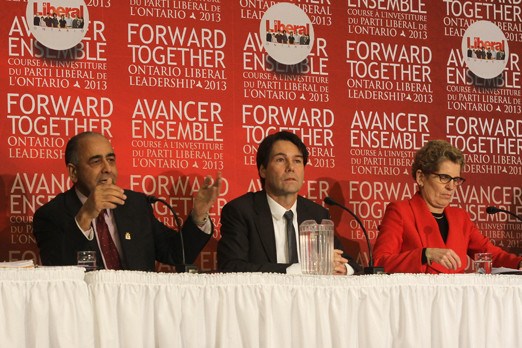THUNDER BAY -- Education, economic development and Aboriginal issues were font and centre as Ontario Liberal leadership hopefuls met for a debate in the city Sunday.
Seven candidates – five current and two former MPPs – took the stage at Lakehead University’s lecture theatre in a civil question-and-answer style debate that saw little tension between contenders.
Throughout the two-hour session former Winnipeg mayor Glen Murray, who was training, colleges and university minister most recently, stressed that the North needed a new form of regional government that could make its own decisions on everything from infrastructure to energy pricing.
“It is time to give Northerners their voice back and control over their taxes,” he said.
But Lyn McLeod-endorsed Kathleen Wynne, most recently the Minister of Municipal Affairs and Housing along with Aboriginal Affairs, said she would rather use the advice of the forthcoming Northern Policy institute to make decisions rather than a regional government.
“Sometime in this conversation it starts to sound like a separation process,” she said.
On the Ring of Fire, Wynne said the development won’t become a reality unless other issues are addressed like substance abuse and graduation rates in the Far North. She cautioned that if social issues in the region weren’t taken care of, then Ring of Fire development could be in jeopardy.
Meanwhile, Gerard Kennedy championed a more hands-off approach, and promised that within six months he would have a plan of principles to move forward with all of those involved.
“The provincial government’s job is to not get in the way,” he said.
While infrastructure like roads, rail and transmission were important, former government services minister Harinder Takhar said legislation is needed to outline how the province consults with the First Nations communities around the development.
“We cannot do that on a project-by-project basis,” he said.
Eric Hoskins, most recently child and youth services minister, agreed that more discussion needed to happen with all of those involved in the development instead of decisions being made at Queen’s Park without consultation.
“We need to do a better job of connecting with them,” he said.
Former citizenship and immigration minister Charles Sousa said that new and trustworthy revenue-sharing agreements were needed with not only extraction but processing in mind.
“All of this means we make our decisions on return of investment,” he said.
As for the region’s potential beyond natural resources, Sandra Pupatello, endorsed by both local MPPs and back from the private sector, said manufacturing, professional services and tourism will boost the Northern economy.
“We can do this people,” she said.
Takhar said the province needed to focus the beauty of Northern Ontario by creating a fund to promote filmmaking using the region.
“We want to make sure the world sees that,” he said.
On Aboriginal youth and what the first priority would be should they lead the Liberals, candidates said there was some good work already done but a lot left to go.
The entire country, not just Ontario, requires an entire new vision on how it deals with failures in the past and what will happen with First Nations people in the future Hoskins said.
“We need to be honest about our failures,” Hoskins said.
Kennedy said that more needs to be done to focus on the positives in Aboriginal communities in order to bridge the gap between First Nations and mainstream culture.
“We have to be prepared to do whatever it takes. We cannot leave these kids out of the equation,” he said.
For Pupatello, looking outside of the province for answers might help address issues like First Nations high school graduation rates.
“We don’t have all the ideas here in Ontario,” she said.
Initiatives like Thunderbird house in Winnipeg have helped First Nations youth dealing with abuse issues find self-esteem. But those initiatives require volunteers, which is every person’s responsibility Murray said.
“We have to be citizens again,” he said. “Not just a taxpayer.”
Education was also key for Aboriginal success candidates said. Wynne said that residential schools need to be taught in the education system.
“About the history as it actually took place,” she said.
And addressing the funding gap with the federal government for Aboriginal education Kennedy said.
“If they won’t do it we need to do it anyway,” he said.
Hoskins, Takhar and Murray had different ideas for tuition reduction on the question of post-secondayr education. Murray said students shouldn’t pay tuition up front but pay it back based on a percentage of income once they were out of school. Takhar said that businesses should be given rebates for hiring students while Hoskins said more grants to tackle youth unemployment could help.
Wynne said that the provincial government needs to improve its relationship with education workers as dozens rallied outside of the debate to protest Bill 115.
“Job number one for me on January 28 would be to open my doors,” she said.
It was the second leadership debate. The leader will be chosen next month in Toronto.
